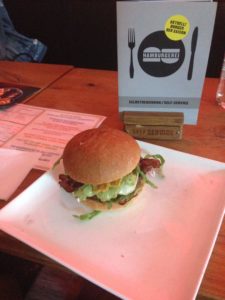Tonight I had an interesting encounter, which I shall here recount, as I find it to be interesting in itself and furthermore indicative of the progress I’ve made in the German language over my few weeks here in Munich.
I was returning from an evening of footballing with some friends (football here means soccer–I call it football only in an effort to fully immerse myself in the German culture) and, as I normally do, I walked to the tram station to await the

next tram back to my house. As I approached, I noticed, as is not uncommon at public transportation stops, a few people sitting on the benches and waiting for the next bus. Three of these people clearly made up one group, and they chatted busily amongst themselves. Struck with a brilliant idea, I seated myself next to this group, intending to eavesdrop and hone my listening skills, which are a weak spot for me. From what I could gather, they had gone to a casino, and were recounting how much money each had won or lost. (From this retelling I concluded that there were formerly additional members of the party, but these others however had already gone home for the night.) Additionally, they seemed to be arguing about the appropriate amount to tip someone for something (I was a little fuzzy on this part of the conversation).
Suddenly the woman in the group turned to me–I was mid-sip with my bottle of water, and trying to look like I wasn’t eavesdropping–and said something about getting something to drink. I smiled and said something about yes, I was drinking water. She continued talking to me. For some reason, I struggle when locals talk to me. I can understand them reasonably well when they talk with each other, but as soon as they turn to me, I freeze and find myself unable to process the

words that are being spoken. I did however catch a few words that led me to believe she was asking for directions. I stood up and walked her over to the transit map at the tram stop.Then, using fancy German words like “umsteigen”, “Bus”, and “Tram”, I talked her through a fairly complicated route to her desired location. The best part of this encounter was not that she understood the instructions I gave, nor that I’m now familiar enough with the city to give directions involving changing buses and subways and trams. The best part of this encounter was that, after about a full minute of conversation, she stopped me and said, “You’re not German, are you?” I informed her that I was not. “Yeah,” she said, “I could tell by your accent.”
By my accent–not by my limited vocabulary or my subpar grammar, not by my relative lack of experience with the language, but by my accent.

I’ve really been working hard at improving my vocabulary and grammar, at being able to speak more easily and more confidently, and in this one small interaction, it paid off. It’s very rewarding to study for hours every day in class and then finally start to see some results in real-world encounters. A few weeks ago, it would have been immediately obvious that I had no idea what I was doing with the German language. But now, I’ve put in some work and some time, and I’ve taken significant strides toward fluency.
For me, this interaction was really encouraging. Perhaps she was just being nice, and perhaps my grammar and vocabulary still mark me as a non-native speaker from the instant I open my mouth, but I really think that’s no longer the case. I still have a long way to go, but I’ve come a long way as well, and it’s great to see that time I’ve spent result in a positive experience like this one.